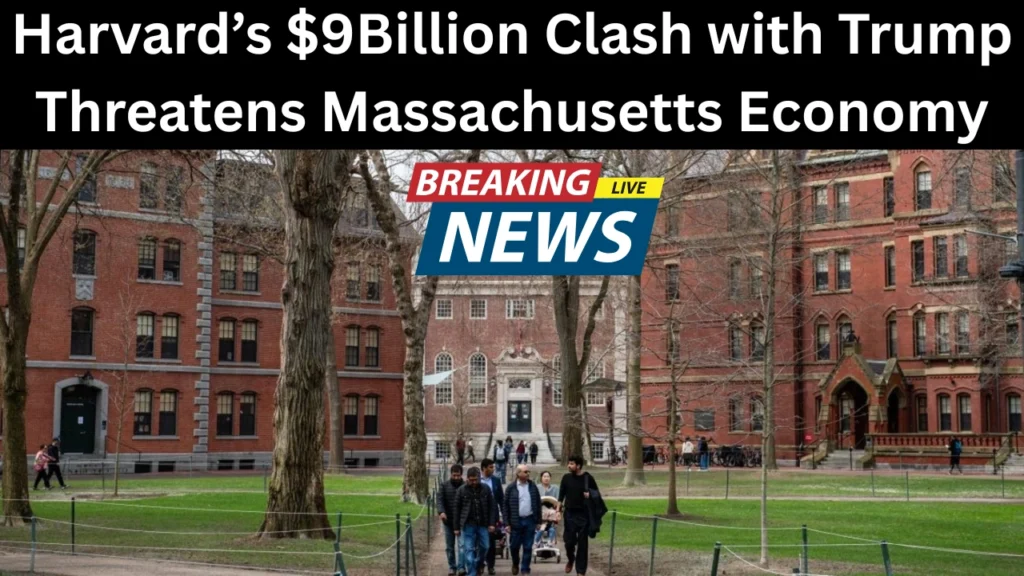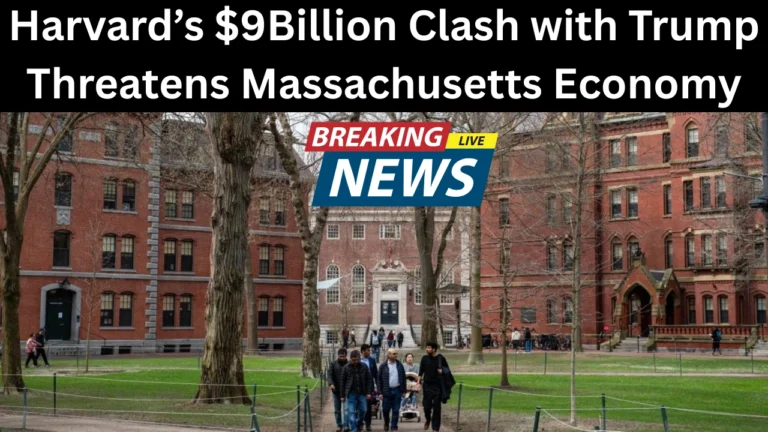Harvard University’s ongoing legal battle with former President Donald Trump has captured national attention, but the implications of this high-stakes clash stretch far beyond political ideology or academic freedom. At the heart of this confrontation lies a potential economic ripple effect that could profoundly impact Massachusetts’ economic engine, which is deeply intertwined with Harvard and its affiliated institutions.

The university’s refusal to strike a compromise with the Trump administration—following threats to withdraw up to $9 billion in federal funding—has drawn both praise and concern. While political leaders in Massachusetts lauded Harvard’s stance on defending institutional independence and resisting overreach disguised as antisemitism enforcement, economists and business leaders are now ringing alarm bells over the broader economic consequences.
🚨 BREAKING: HARVARD JUST ENTERED FULL FAFO MODE 🚨
— Jim Ferguson (@JimFergusonUK) April 15, 2025
Harvard University is defying the Trump administration — risking $9 BILLION in federal funding.
Their message? Loud. Arrogant. Dangerous.
🗣️ “We will not surrender our independence or relinquish our constitutional rights.”… pic.twitter.com/z3OLqFHKdl
A Defiant Stance Sparks a Financial Backlash
On Monday, Harvard rejected a proposed agreement from the Trump administration that many critics said extended far beyond its purported goal of combating campus antisemitism. The university argued the demands infringed on academic independence and institutional governance, raising concerns about precedent-setting political interference.
Hours later, retaliation came swiftly: a federal task force froze $2.2 billion in multiyear grants, a move enthusiastically supported by Trump, who declared on social media that the school had “lost its way.” But as Harvard braced for a prolonged legal standoff, a wave of support rolled in from the state’s most prominent Democratic leaders—many of whom share deep personal and professional ties to the university.
Political Support Meets Economic Anxiety
Governor Maura Healey, a Harvard alumna and former basketball team captain, voiced strong support for the university’s leadership, stating that Massachusetts must “protect and defend” institutions that fuel the state’s knowledge economy. Likewise, Senator Elizabeth Warren, Congressman Seth Moulton, and Representative Jake Auchincloss echoed similar sentiments, defending Harvard’s defiance as an act of moral and constitutional courage.
Yet, beneath the celebratory tone, there’s growing concern about the economic fragility exposed by the funding freeze.
Harvard’s Economic Role in Massachusetts
Harvard isn’t just an academic institution—it’s a cornerstone of the Massachusetts economy. Along with other prestigious universities and hospitals, it helps sustain an ecosystem that includes:
- 320,000+ jobs in the education sector
- $71 billion in annual economic output
- Thousands of research collaborations
- A massive healthcare and biotech industry pipeline
Harvard alone employs more than 18,700 Massachusetts residents, making it the fourth-largest employer in the state. These roles include professors, research assistants, lab techs, administrators, and countless contract workers dependent on federally funded projects.
From Research Labs to Real Estate: The Domino Effect
The potential funding freeze could unleash cascading economic consequences. Harvard-affiliated hospitals and research centers such as Mass General Brigham and Boston Children’s Hospital are among the nation’s top recipients of federal medical research grants. Already, some researchers at Harvard have been hit with stop-work orders, jeopardizing long-standing projects on critical health issues, including tuberculosis and organ-chip innovation.
While the Department of Education has stated that affiliated hospitals are not currently affected, uncertainty looms. The interwoven nature of Harvard’s research funding—often shared among university departments and hospital partners—makes it difficult to separate institutions cleanly.
As Anne Klibanski, CEO of Mass General Brigham, noted, the full scope of the impact remains “unknown.”
Harvard’s Unique Position and Its Limits
With an endowment of $53 billion, Harvard has more financial flexibility than most universities. However, even that considerable war chest can’t easily replace the scale and consistency of federal research grants. While Harvard might weather the storm in the short term, individual labs, graduate students, and early-career scientists may face job losses and halted careers.
Moreover, Massachusetts Institute of Technology (MIT) and other regional institutions may not be as shielded from potential spillover. MIT President Sally Kornbluth has already highlighted the risks of broader cuts from agencies like the National Institutes of Health (NIH) and Department of Energy, alongside visa revocations impacting international students—many of whom form the backbone of local academic and scientific talent.
Trump’s Wider Crackdown
Harvard’s funding battle is not happening in isolation. The Department of Justice is also reviewing Boston’s handling of alleged antisemitic incidents, adding to the mounting federal scrutiny of Massachusetts institutions.
Further compounding fears, the Trump administration has threatened to cut off funding to sanctuary cities, including Boston. The city receives roughly $300 million annually from the federal government, funding essential services and infrastructure.
This confluence of legal pressure, funding threats, and ideological tension raises a profound question: Can Massachusetts’ education and research ecosystem withstand such a multi-pronged assault?
What’s at Stake for Businesses and the Broader Economy
Governor Healey has called on the business community to recognize what’s at stake. Funding cuts to Harvard and related institutions would ripple through the broader economy:
- Laboratories may cancel equipment orders
- Banks and law firms could lose institutional clients
- Real estate companies may see reduced demand from research tenants
- Startups and biotech firms may lose access to critical academic partnerships and talent
According to a report from United for Medical Research, each dollar of NIH-backed research returns $2.56 in economic activity, underscoring the multiplier effect of these investments.
Balancing Academic Freedom and Public Accountability
Despite criticisms from some quarters—including Rep. Auchincloss, who had previously suggested funding cuts as a consequence for universities’ handling of antisemitism—there’s now a more united front behind Harvard’s right to preserve academic independence. Auchincloss this week emphasized the importance of defending teaching and research from political pressure, while also urging Harvard to do more to address antisemitism and encourage ideological diversity.
Final Thoughts
The Harvard-Trump legal clash is shaping up to be a defining moment—not just for one institution, but for Massachusetts as a whole. The confrontation brings to light the fragility of a region heavily dependent on federal dollars for education and medical research, and it challenges assumptions about the resilience of elite institutions in the face of political and financial pressure.
While Harvard’s refusal to capitulate may be hailed as a moral stand, the economic consequences of this legal battle are far from symbolic. With billions of dollars, tens of thousands of jobs, and the vitality of one of America’s top innovation ecosystems on the line, the stakes could not be higher.

